

Shakespeare Insult Kit. Shakespeare Insult Kit Since 1996, the origin of this kit was listed as anonymous.

It came to me on a piece of paper in the 90's with no attribution, and I thought it would make a cool web page. Though I searched for the origin, I could never find it. In 2014, Lara M informed found the originating author. It appears to be an English teacher at Center Grove High School in Greenwood Indiana named Jerry Maguire. Combine one word from each of the three columns below, prefaced with "Thou": My additions: cullionly whoreson knave fusty malmsey-nosed blind-worm caluminous rampallian popinjay wimpled lily-livered scullian burly-boned scurvy-valiant jolt-head misbegotten brazen-faced malcontent odiferous unwash'd devil-monk poisonous bunch-back'd toad fishified leaden-footed rascal Wart-necked muddy-mettled Basket-Cockle pigeon-liver'd scale-sided Back to the insulter. Chris Seidel. Do You Speak American . Words That Shouldn't Be? . Sez Who? What, like, makes language change?
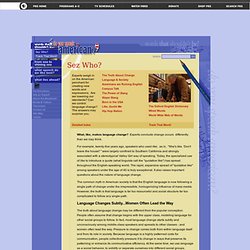
Experts conclude change occurs differently than we may think. For example, twenty-five years ago, speakers who used like, as in, "She's like, 'Don't leave the house! ' " were largely confined to Southern California and strongly associated with a stereotypical Valley Girl way of speaking. Do You Speak American . What Lies Ahead? What's in store for American English?
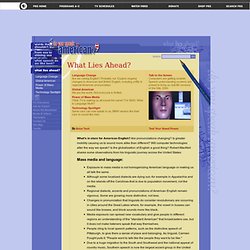
Are pronunciations changing? Is greater mobility causing us to sound more alike than different?
4.2 Language Change Theorists – Millroy, Trudgill, Aitchison, Deutscher & Harlow « i love english language. Main point: Within his article, James Milroy makes a few points although the main theme running through his article is his argument as to whether there was once a Golden Age within spoken and written language. Some Linguists and Theorists have commented that there was once a time in our English Language that both Spoken and Written language was perfect and unmistakeable.
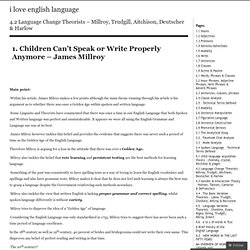
It appears we were all using the English Grammar and Language use was at its best. James Milroy however tackles this belief and provides the evidence that suggests there was never such a period of time as the Golden Age of the English Language. Therefore Milroy is arguing for a loss in the attitude that there was ever a Golden Age. Milroy also tackles the belief that rote learning and persistent testing are the best methods for learning language. Something of the past was consistently to have spelling tests as a way of trying to learn the English vocabulary and spellings and also have grammar tests.
My opinion? Nice.
Change: lexical-semantic. ENGB3 Language Change. Advertising and changes in language. 20th century. Use It or Lose It: Why Language Changes over Time. The words used the most in everyday language are the ones evolving at the slowest rate, say two new studies published in Nature.
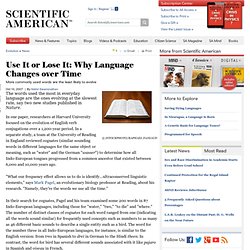
In one paper, researchers at Harvard University focused on the evolution of English verb conjugations over a 1,200-year period. In a separate study, a team at the University of Reading in England reviewed cognates (similar sounding words in different languages for the same object or meaning, such as "water" and the German "wasser") to determine how all Indo-European tongues progressed from a common ancestor that existed between 6,000 and 10,000 years ago.
"What our frequency effect allows us to do is identify…ultraconserved linguistic elements," says Mark Pagel, an evolutionary biology professor at Reading, about his research.
Grammar. Lexis. Lexical Change. Linguists reveal the 100 words that have shaped the English language. 5 words you didn’t know were acronyms. A proposed addition to the way we punctuate now. In a recent interview over our dining room table, Ellen Susan revealed, exclusively to me, her latest epiphany: The obvious need for a new punctuation mark.
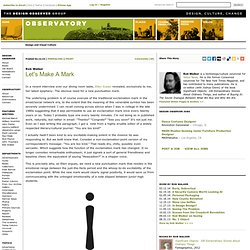
The underlying problem is of course overuse of the traditional exclamation mark in the email/social network era, to the extent that the meaning of this venerable symbol has been severely undermined. I can recall coming across advice when I was in college in the late 1980s suggesting that it was permissible to use an exclamation mark once every twenty years or so.
Today I probably type one every twenty minutes.
Timelines: Sources from History. This British Library timeline allows you to explore collection items chronologically, from medieval times to the present day.

It includes a diverse combination of texts: those that allow glimpses of everyday life (handbills, posters, letters, diaries), remnants of political events (charters, speeches, campaign leaflets), and the writings of some of our best known historical and literary figures. Launch the interactive Flash timeline above, or explore each of the historical sources in the centuries below. Magna Carta, medieval maps, manuscripts & more... Medicine, rural life, the Peasants’ Revolt... Canterbury Tales, Western printing & more... Literature and changes in language. East Norfolk English Language: The full story... History - British History in depth: The Ages of English.
History - British History in-depth: British History timeline. The History of the English Language in Ten Animated Minutes. Learning at the British Library.